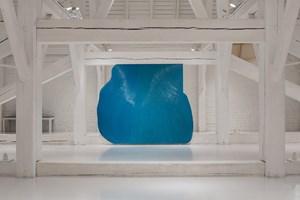
Amanda Ziemele will present “O day and night, but this is wondrous strange… and therefore as a stranger give it welcome” for the Latvian Pavilion at the 60th International Art Exhibition – La Biennale di Venezia from April 20 until November 24, 2024. The Pavilion will be curated by Adam Budak, the Director of Kestner Gesellschaft, Hannover and is commissioned by Daiga Rudzāte, the Head of the INDIE Culture Project Agency.
Throughout her practice, Amanda Ziemele has created painterly environments that are often choreographed across all parameters of a given space. In a subtle though bold act of subversion, she will transform the Latvian Pavilion’s interior into a living organism. Taming space and animating dimensions, Ziemele will welcome viewers into a polyphonic habitat of hospitality.
An underlying yet integral narrative of Amanda Ziemele’s project for the Latvian Pavilion, which its ideas and concepts germinate from, is English schoolmaster and theologian Edwin A. Abbott’s novella “Flatland: A Romance of Many Dimensions”, released in 1884 under the pseudonym A Square. Part geometry lesson, part social satire, this classic work of science fiction (or “mathematical fiction”, as some call it) playfully aims to expand the reader’s imagination beyond the limits of our “respective dimensional prejudices”. Meant as a parody of Victorian society, in which all existence is reduced to length and breadth (its inhabitants unable even to imagine a third dimension), Abbott’s tour de force of pseudo-scientific writing is a paean to human knowledge and the imagination that motivates it, a witty study of perception and the accessibility of absolute truth.
Seduced by Abbott’s hypotheses about a fourth and higher dimensions, the artist (a polyglot of space) sets up a challenge to investigate its relevance today by opening it up towards the space understood as queer ecology: a multidimensional habitat of polyversal thinking based upon diversity, inclusiveness, and interconnectivity, gendered beyond belief and convention, both corporeal and sensual, where radical tenderness rules. Following Abbott’s Shakespearian thread “o day and night, but this is wondrous strange... and therefore as a stranger give it welcome”, she unfolds the mysteries of three dimensions in a fluid transition from flatland to thoughtland by creating a microcosm of embrace and unconditional hospitality under threat. Eight figures of heightened identity and monochromatic (sur)faces.
“At the confluence of absence and presence, daylight is an instrument inviting the viewer to a self-reflective journey through a world in disarray and with no measure, a displaced universe of mutual hospitality, a warped space where the other is a gift. This is Amanda’s version of a mature space, a counter-phantasmagoria, resisting exhaustion and fatigue, a space with an attitude, ready to think and host the irregular world of contemporary society. The healing – and the necessity of healing – is what Amanda’s project ultimately offers to us,” Curator, Adam Budak emphasizes.
Amanda Ziemele’s project for the Latvian Pavilion comes to life through cooperation with the architect Niklāvs Paegle and Agnese Krivade, described as “a poet not only in words but also in movement.”

ArtDependence Magazine is an international magazine covering all spheres of contemporary art, as well as modern and classical art.
ArtDependence features the latest art news, highlighting interviews with today’s most influential artists, galleries, curators, collectors, fair directors and individuals at the axis of the arts.
The magazine also covers series of articles and reviews on critical art events, new publications and other foremost happenings in the art world.
If you would like to submit events or editorial content to ArtDependence Magazine, please feel free to reach the magazine via the contact page.